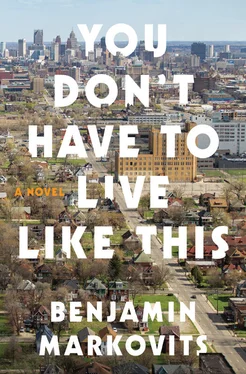I said to her, “It seems to me that your first port of — concern should be me, should be what happened to me and what I’m going through. .”
“What are you going through, Marny?”
“This, for one thing.”
“You need to toughen up then. If you think this is bad.”
She had cried herself out, but underneath the softness was more hardness. I got a sense of that, too. You live with somebody, in a state of real intimacy, you sleep in her bed (we were at Gloria’s place; she was unpacking), you watch TV together, you leave the bathroom door open, and then you realize she can step out of this intimacy if she wants, she can make decisions about it. At least since I was at her place she couldn’t go home. And she couldn’t bring herself to kick me out either, that was a bridge too far. So I knew that at some point that night we would lie down in bed together, in close proximity, with the light off, which gave a reasonable chance for our actual real affection for each other to come out, like some kind of hedgehog in the dark. Which is what happened.
“I’m sorry, baby,” she said. “I’m not really mad at you. I’m just worried about Nolan, I’ve known him for a long time, and it’s confusing for me that you’re in the middle of this. I feel like I have to take sides, and somehow I’m on the wrong side. Just lying here like this with you.”
“So let’s not have sides,” I said.
Nolan turned out to be okay — medically, I mean. He regained consciousness in the ambulance; the diagnosis was severe concussion. I didn’t think Tony kicked him that hard, but who knows. Nolan used to play football, free safety, he had a history of concussions, and this is one of those repetitive things, where the more you get it, the more vulnerable you are. It’s a complex field; the damage isn’t always structural. At least, the doctors disagree about that — a lot of what goes on is at the micro level. Synapses. Neuropsychiatry. You become predisposed. I started reading up on all this stuff; there were stories in the newspaper, too.
I tried to remember exactly what had happened. Nolan was kind of getting up, he was halfway up when Tony kicked him. His head snapped back when he hit the ground. This was an image that replayed itself in my mind. Apart from anything else because people kept asking me about it. Korobkin, Lisicki. Beatrice and Robert James. When you describe something often enough you remember what you describe and not what you saw.
They kept him overnight at the hospital, under police guard. His medical problems weren’t the issue. Undressing him, the nurses found a gun. It wasn’t loaded, but it wasn’t licensed either, and Korobkin said it could add a minimum of two years to his sentence. If he was convicted, that is. In which case there would be a lot of technical code to work through, a complicated points system. It was like scoring ice skating, except instead of medals they gave you months and years. The worst-case scenario was life in prison with the possibility of parole, but there were mitigating circumstances. Michael didn’t get hurt and the whole thing played out very quickly. Little details, like leaving the kid at his mother’s house, were likely to sit well with a judge. But the gun didn’t help, and Nolan also had a criminal record. One count of disturbing the peace, and a misdemeanor drug charge he picked up in college. That didn’t help either. Korobkin figured he could be looking at ten years.
When the doctors released him, the cops took over, and a judge set bail—$100,000. Nolan didn’t have access to that kind of money. They couldn’t even raise 10 percent for the bondsman.
I wanted to visit him in jail, but Korobkin advised against. I saw a lot of this guy over the next ten months, because what happened next happened in different stages, it took time, there were court appearances, things to sign, meetings with lawyers. It became an aspect of my life but not my whole life, though it affected the rest of my life, too.
Korobkin liked to talk baseball to me. He had Tigers season tickets, and every time I saw him, we spent maybe half the conversation on baseball. For a while it looked like the Tigers had a chance of making the playoffs, Cabrera was having a great year, knocking it all over the park. And Verlander put up his usual strong numbers. He got called up for the All-Star Game at the last minute. “What you need in this league,” Korobkin said, “is a slugger and an ace, and we have both.” But then guys got hurt and the White Sox put clear water between them, before the Twins pulled away. I had to listen to his complaining, too.
He offered to take me to a ball game, but I said no.
“You can talk about the game,” I said, “but don’t make me watch it.”
“You know who you should have heard call a ball game? I’ll tell you who.” Korobkin was a big Ernie Harwell fan, the old Tigers broadcaster, who’d died in May. “He was one of those play-by-play announcers they should study in high school English classes. When a guy struck out looking, Ernie used to say, he stood there like a house by the side of the road.”
The case was slowly taking shape but all of this takes an unbelievable length of time. The first thing you realize is, you want this thing resolved so you can move on with your life, but you have to live your life anyway because this thing is about to become a part of it. Kidnapping is a felony offense, even if the whole business doesn’t last but a couple of hours, even if no one gets hurt, and the political context looked bad for Nolan. I mean, what he said to me, “I’m just making him sweat a little,” which went towards motive. Korobkin asked me repeatedly about this line, and what Nolan said afterwards, about applying pressure. I had motives, too, operating at cross-purposes to each other, and from the beginning I decided to drown out the noise by concentrating as much as possible on telling the truth. But for reasons that slowly became clear this was unsatisfactory.
I kept trying to understand what had happened, and the law was one way of understanding it. But I felt like you feel when you’re a kid and your parents tell stories about you at the dinner table. That’s not the way it was, you want to say. Even if it’s all true. Just because Nolan picked up some kid in his car, who was maybe wandering in the road or in Robert’s garden (this fact was still under dispute), and brought him to his mother’s house, where we picked him up a few hours later, Nolan was looking at ten years in jail. Maybe a quarter of the life he had left. There seemed to be something disproportionate — I don’t just mean about the sentencing guidelines, though that, too. I mean about the way some stupid impulse, some spur of the moment thing, can become a permanent feature or scar in somebody’s life. I guess I don’t like the way facts become facts. I remembered the feeling of that hot afternoon, it was muggy, too, Tony and I were both a little drunk, and I had a hangover coming on, but what I mean is I felt like I was operating the whole time at some slight remove from reality, I didn’t have great access. We were all just floundering around, trying to get a grip on something, and now, one month, two months, three months later, that floundering turned out to be the reality, and that other thing, the thing we needed to come to terms with, might as well not have existed.
The first sign of things to come was Nolan’s release — someone posted bail. This was great for Nolan, but it meant people were raising money on his behalf, there were powerful donors, and the case was turning into a political football. People on every side kicked us around. There was a guy named Simon Kaplow, a law professor at Wayne State, who had been involved in local politics for years. He wrote an op-ed piece in the Free Press , he showed up on Channel 7 news. There was a vacancy on the city council, Dee Dee McIlvane had just stepped down, and Kaplow tried to turn the election into a referendum on the five neighborhoods. He backed a woman named Molly Brinkley, a former superintendent of schools; Gloria knew her a little bit. She said, “Publicly I like everything about Molly. She’s got a lot of good ideas, I think she’s honest, she works hard, she stands for the right things, but she’s also personally a real mean little person, she’s petty, she bears grudges, she’s manipulative, she’s not somebody I’d like to have any kind of business with.”
Читать дальше












